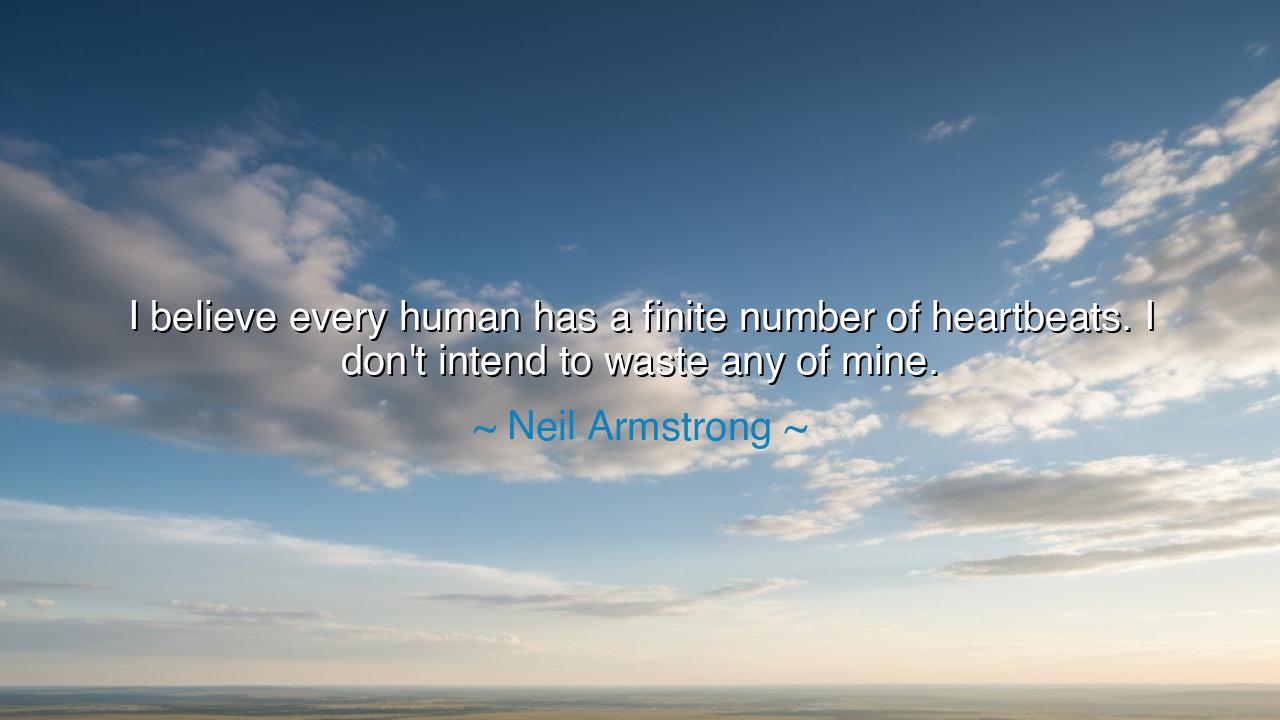
I believe every human has a finite number of heartbeats. I don't
I believe every human has a finite number of heartbeats. I don't intend to waste any of mine.






“I believe every human has a finite number of heartbeats. I don’t intend to waste any of mine.” — these are the words of Neil Armstrong, the first man to set foot upon the moon, a man whose life was a hymn to purpose, courage, and discipline. Spoken with the quiet strength of one who had touched both the heavens and the earth, this saying is more than a reflection on mortality — it is a declaration of intentional living. Armstrong, who had risked his life in the boundless dark of space, understood the fragile rhythm of existence. Each heartbeat, he reminds us, is a gift — limited, fleeting, and sacred. To waste it in aimless pursuit or idle comfort is to squander the only currency of life itself.
In the ancient manner, one might say that Armstrong spoke as a philosopher of action, not of words. His wisdom echoes the teachings of the Stoics, who believed that time — not wealth or fame — is man’s most precious possession. “Life,” said Seneca, “is long enough if it is well lived.” And so Armstrong’s saying becomes a modern echo of that ancient truth: to live fully is not to live long, but to live awake, to pour meaning into each breath, to ensure that not one heartbeat is given to regret or waste. The finite number of heartbeats is not a curse, but a call — a reminder that life’s brevity is what gives it beauty, focus, and fire.
When Armstrong spoke these words, he was not romanticizing death; he was honoring life. As a test pilot, astronaut, and engineer, he had seen how thin the line between life and eternity could be. He knew that every flight, every mission, every ascent carried the weight of possibility and peril. Yet he did not fear that limit — he embraced it. For the awareness of death does not weaken the soul; it sharpens it. It drives a man to act with purpose, to pursue excellence, to love deeply, and to use every heartbeat in the service of something greater than himself.
The story of Neil Armstrong’s journey to the moon is itself a testament to this philosophy. In 1969, when he took that small step onto the lunar surface, he was not acting for personal glory. He stood there as a representative of humanity — of what the human spirit can achieve when it refuses to waste its heartbeats in fear or hesitation. He had endured years of study, countless hours of training, the cold silence of space, and the ever-present shadow of death. Yet through it all, his purpose was unwavering. He lived not by chance, but by intention — a man who measured his moments not by number, but by meaning.
But this truth extends beyond heroes and astronauts. It speaks to every soul who walks the earth. For each of us, though not called to walk upon the moon, is called to walk upon our own path of purpose. The heartbeats we spend — in love, in creation, in service — are what define our legacy. To waste them in resentment, idleness, or fear is to betray the gift we have been given. Armstrong’s words are not about speed or urgency alone — they are about mindfulness, about choosing to fill our days with acts that matter, words that heal, and dreams that elevate.
Consider also the story of Florence Nightingale, who, during the dark nights of war, tended to the wounded by candlelight. She too must have known the limits of her heartbeats — yet she spent them all in service. Each beat of her heart became an act of compassion. Like Armstrong, she lived not for comfort but for contribution. In their different ways, both understood that life’s measure is not in its length, but in its depth — not in how many times the heart beats, but in what it beats for.
So, my child, take these words as sacred counsel: Do not waste your heartbeats. Spend them on what strengthens the soul. Let your time be marked not by distraction, but by devotion. When you work, give it your best. When you love, love fiercely. When you rest, rest with peace. Remember that each heartbeat is a drum of destiny, counting down the moments of your story. Do not let them fade in triviality; let them resound with purpose.
For in the end, when the heart grows still, it will not matter how many beats it held, but how many lives it touched. And if you have lived as Armstrong did — with courage, clarity, and wonder — then you will have used your finite heartbeats to create something infinite. And that, my friend, is the true measure of a life well lived.






AAdministratorAdministrator
Welcome, honored guests. Please leave a comment, we will respond soon